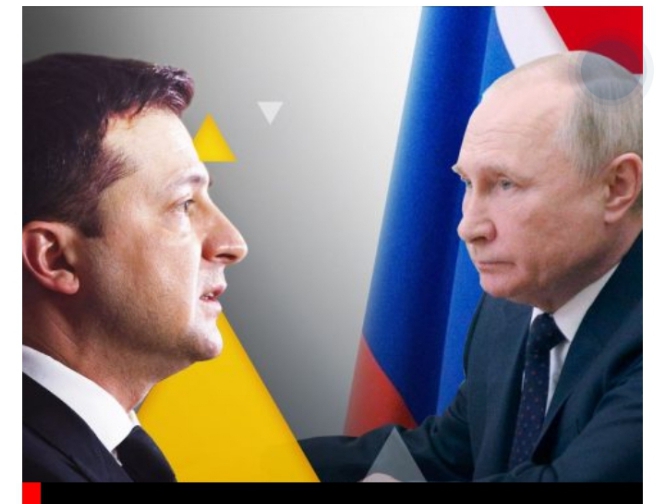Russia, US to appoint negotiators for Ukraine peace talks
Russia and the United States on Tuesday agreed to establish teams to negotiate a pathway to ending the war in Ukraine, following talks that drew a strong rebuke from Kyiv over its exclusion.
Washington stated that European nations would need to have a seat at the negotiating table “at some point” after holding the first high-level official talks between Washington and Moscow since Russia’s 2022 invasion of Ukraine.
Some European leaders, alarmed by former US President Donald Trump’s policy shift on Russia, fear Washington may make significant concessions to Moscow and reshape the continent’s security framework in a Cold War-style deal.
Ukrainian President Volodymyr Zelensky condemned his country’s exclusion from the Riyadh meeting, which lasted more than four hours.
He insisted that any negotiations aimed at ending the war should be “fair” and include European countries, particularly Turkey, which has offered to host the talks.
“This will only fuel Putin’s appetite,” a senior Ukrainian official, speaking on condition of anonymity, told AFP in response to negotiations proceeding without Ukraine’s involvement.
US Secretary of State Marco Rubio and Russian Foreign Minister Sergei Lavrov agreed to “appoint respective high-level teams to begin working on a path to ending the conflict in Ukraine as soon as possible,” the US State Department announced.
Washington added that both sides had also agreed to “establish a consultation mechanism” to address “irritants” in US-Russia relations, noting that these discussions would lay the groundwork for future cooperation.
Yuri Ushakov, President Vladimir Putin’s foreign policy aide, confirmed the appointment of negotiating teams but said it was “difficult” to set a date for a potential Trump-Putin meeting.
‘Heard Each Other’
The meeting marked a significant diplomatic victory for Moscow, which had been largely isolated for three years under the previous US administration of then-President Joe Biden.
Moscow’s economic negotiator, Kirill Dmitriev, declared that Western attempts to isolate Russia had “obviously failed,” celebrating the renewed talks.
“We did not just listen but heard each other, and I have reason to believe the American side has a better understanding of our position,” Lavrov told reporters.
The veteran diplomat reiterated Russia’s opposition to any deployment of NATO troops in Ukraine as part of a potential ceasefire.
European allies have publicly disagreed this week over whether they would consider sending peacekeeping forces to Ukraine.
UK Prime Minister Keir Starmer stated that he was open to the possibility of committing British troops.
Meanwhile, French President Emmanuel Macron told a regional newspaper on Tuesday that while Paris was not “preparing to send ground troops, which would be combatants in the conflict,” it was considering sending “experts or even troops in a limited capacity, outside any conflict zones.”
German Chancellor Olaf Scholz, however, dismissed any such debate as “completely premature.”
Macron announced plans to host another round of talks with both European and non-European nations on Wednesday, following an emergency meeting in Paris on Monday that brought together a small group of key European countries.
Russia outlined its stance on future negotiations, asserting that resolving the conflict would require a reorganisation of Europe’s defence agreements.
Moscow has long demanded the withdrawal of NATO forces from Eastern Europe, viewing the alliance as an existential threat on its borders.
Before invading Ukraine in February 2022, Russia had called for NATO to pull out of Central and Eastern Europe.
Rubio briefed key European ministers on the Riyadh talks on Tuesday, acknowledging that Europe would need to be involved at some stage.
“There are other parties that have sanctions on Russia. The European Union will have to be at the table at some point because they also have sanctions in place,” Rubio told them.
‘How to Start Negotiations’
The discussions at Riyadh’s Diriyah Palace began without visible handshakes.
Both Russia and the United States described Tuesday’s meeting as the beginning of what could be a lengthy process, downplaying the likelihood of an immediate breakthrough.
Trump has repeatedly claimed he wants to end the war in Ukraine but has yet to present a concrete plan.
The United States has informed both sides that compromises will be necessary if meaningful negotiations are to take place.
On the eve of the summit, Russia declared that it would not consider giving up any Ukrainian territory it had seized.
The Kremlin stated on Tuesday that Ukraine had the “right” to join the European Union but not the NATO military alliance.
It also claimed that Putin was “ready” to negotiate with Zelensky “if necessary,” though it again questioned Zelensky’s legitimacy—a reference to his five-year presidential term having technically expired last year, despite Ukrainian law suspending elections during wartime.
The Ukrainian leader was in Turkey on Tuesday for discussions on the war with President Recep Tayyip Erdogan.


























